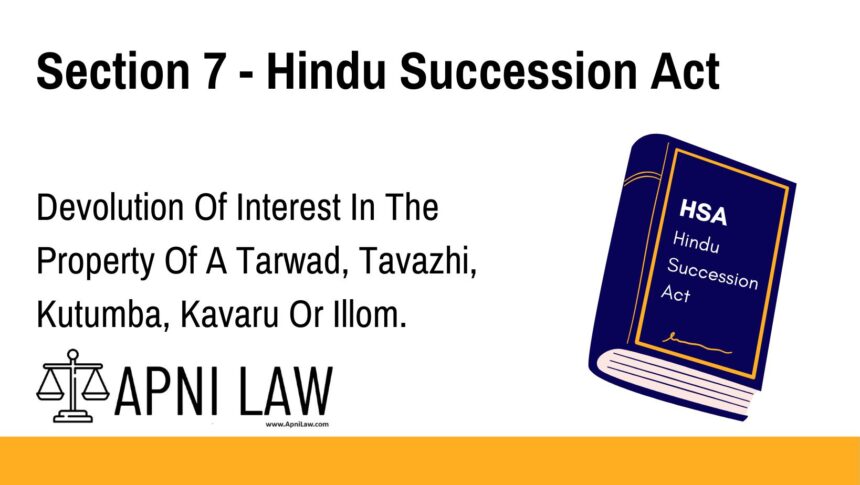Code: Section 7 – Hindu Succession Act
7.
(1) When a Hindu, to whom the marumakkattayam or nambudri law would have applied if this Act had not been passed, dies after the commencement of this Act, having at the time of his or her death an interest in the property of a tarwad, tavazhi, or illom, as the case may be, his or her interest in the property shall devolve by testamentary or intestate succession, as the case may be, under this Act and not according to the marumakkattayam or nambudri law.
Explanation: For the purposes of this sub-section, the interest of a Hindu in the property of a tarwad, tavazhi, or illom shall be deemed to be the share in the property of the tarwad, tavazhi, or illom, as the case may be, that would have fallen to him or her if a partition of that property per capita had been made immediately before his or her death among all the members of the tarwad, tavazhi, or illom, as the case may be, then living, whether he or she was entitled to claim such partition or not under the marumakkattayam or nambudri law applicable to him or her, and such share shall be deemed to have been allotted to him or her absolutely.
(2) When a Hindu, to whom the aliyasantana law would have applied if this Act had not been passed, dies after the commencement of this Act, having at the time of his or her death an undivided interest in the property of a kutumba or kavaru, as the case may be, his or her interest in the property shall devolve by testamentary or intestate succession, as the case may be, under this Act and not according to the aliyasantana law.
Explanation: For the purposes of this sub-section, the interest of a Hindu in the property of a kutumba or kavaru shall be deemed to be the share in the property of the kutumba or kavaru, as the case may be, that would have fallen to him or her if a partition of that property per capita had been made immediately before his or her death among all the members of the kutumba or kavaru, as the case may be, then living, whether he or she was entitled to claim such partition or not under the aliyasantana law, and such share shall be deemed to have been allotted to him or her absolutely.
(3) Notwithstanding anything contained in sub-section (1), when a sthanamdar dies after the commencement of this Act, the sthanam property held by him shall devolve upon the members of the family to which the sthanamdar belonged and the heirs of the sthanamdar as if the sthanam property had been divided per capita immediately before the death of the sthanamdar among himself and all the members of his family then living, and the shares falling to the members of his family and the heirs of the sthanamdar shall be held by them as their separate property.
Explanation: For the purposes of this sub-section, the family of a sthanamdar shall include every branch of that family, whether divided or undivided, the male members of which would have been entitled by any custom or usage to succeed to the position of sthanamdar if this Act had not been passed.
Explanation of Section 7 – Hindu Succession Act
Section 7 of the Hindu Succession Act addresses how property interests in specific traditional Hindu family systems (like tarwad, tavazhi, kutumba, kavaru, and sthanam) should be devolved upon the death of the individual holding those interests, in light of the provisions of this Act.
- For Tarwad, Tavazhi, and Illom: This provision alters how property is handled when a Hindu who was subject to the marumakkattayam or nambudri law passes away. Rather than following these traditional laws, their property will devolve according to the rules of testamentary or intestate succession under the Hindu Succession Act.
- For Kutumba and Kavaru: This sub-section similarly alters how succession occurs if the deceased was under the aliyasantana law. The property interest will devolve by the Hindu Succession Act, with the deceased’s share calculated in the same manner as if a partition had been made immediately before their death.
- For Sthanamdar Property: If a sthanamdar dies, their property will be divided per capita among the family members, and the shares will be held as separate property.
This section ensures uniformity in how property devolves under the Hindu Succession Act, replacing older customary laws that may have previously governed succession.
Illustration
Example 1: Property Devolving under Tarwad
A Hindu who is a member of a tarwad dies, having held an interest in the property. Before the Hindu Succession Act was passed, succession would have followed the marumakkattayam system. After the Act, the deceased’s interest in the property devolves through testamentary or intestate succession, as if the property had been partitioned equally among all the members of the tarwad at the time of death.
Example 2: Property Devolving under Kutumba or Kavaru
A person with undivided interest in the property of a kutumba dies. The deceased was under the aliyasantana law. Post the Hindu Succession Act, the interest devolves by the rules of intestate or testamentary succession, calculated based on the share they would have received if a partition had been made.
Example 3: Sthanamdar Succession
A sthanamdar dies, and his property passes to the family members per capita, with each member and the heirs of the sthanamdar receiving their separate share as if a partition had taken place.
Common Questions and Answers on Section 7 – Hindu Succession Act
1. What happens to the property of a Hindu under the marumakkattayam or nambudri law after this Act?
- Answer: The property devolves according to the Hindu Succession Act, by testamentary or intestate succession, rather than following the marumakkattayam or nambudri law.
2. How is the interest in the property of a kutumba or kavaru calculated?
- Answer: The interest is deemed to be the share that would have fallen to the deceased if a partition of the property had been made immediately before death among all living members of the kutumba or kavaru.
3. What happens to sthanam property upon the death of a sthanamdar?
- Answer: The sthanam property devolves upon the family members and heirs as if the property had been divided per capita immediately before the death.
Conclusion
Section 7 of the Hindu Succession Act modernizes and standardizes how property succession works for certain Hindu family systems, moving away from traditional practices like marumakkattayam and aliyasantana laws. It provides clear instructions on how to handle property interest in these cases, ensuring that succession occurs under the more uniform rules established by the Hindu Succession Act.








